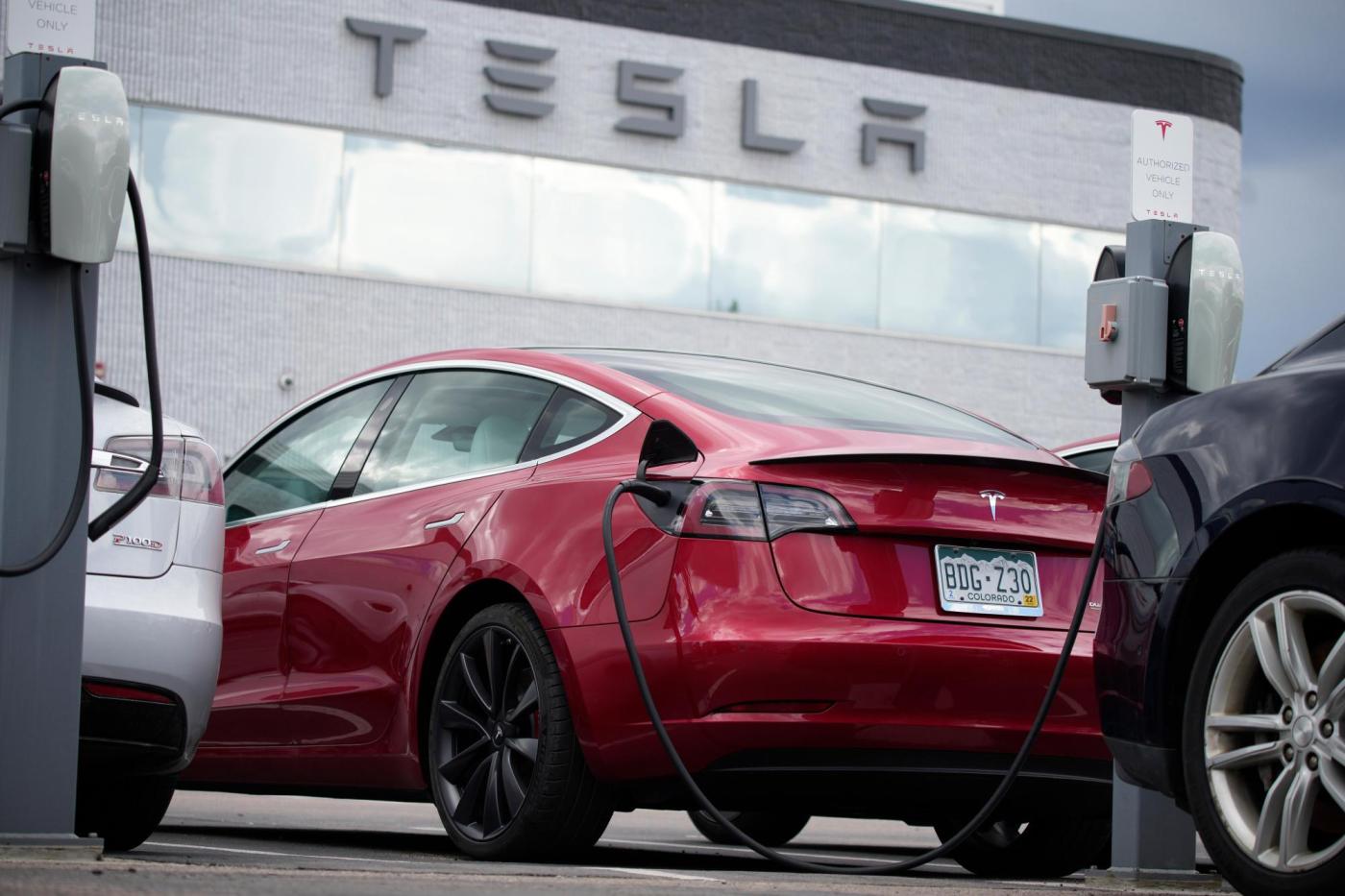
Liam Denning: Musk is short-circuiting the EV revolution he sparked
There’s a crazy idea going around, fueled by one Elon Musk, that Tesla Inc., an electric vehicle maker, would be unscathed if Republicans ditch the federal EV tax credit.
There is a certain superficial logic at work. Tesla is a profitable EV maker years ahead of the competition in designing and selling vehicles powered by batteries. Old automakers like General Motors Co. and Ford Motor Co., meanwhile, are playing catch-up and losing money on EVs. Were tax credits for EV buyers withdrawn, Detroit automakers’ losses would deepen, in part because they need to expand sales to cover the investments in plant and equipment already made and the price shock would drive customers away. Tesla would also suffer a bit, but its higher margins offer insulation and, in any case, it’s about to conquer the worlds of autonomous driving and artificial intelligence.
Bits of this are true. Detroit would suffer. Tesla’s valuation does mostly reflect dreams of robotaxi and AI dominance. But here are two counterpoints: Detroit mostly sells vehicles with internal combustion engines and Tesla’s core autos division sells only battery EVs.
The tailwinds behind EV adoption under the administration of President Joe Biden may have obscured the fact that internal combustion engines still dominate the U.S. market. Battery EVs and plug-in hybrids constitute just 10% of sales, and the price war of the past two years is testament to the slowdown in growth despite help from Biden’s green legislation, such as those credits in the Inflation Reduction Act. EVs compete with each other, sure, but in a country famously in love with big, hard-to-electrify vehicles, they mostly compete with gas guzzlers.
Recognizing this is the first step in any effort to electrify the entire fleet — which was Tesla’s north star as recently as last year. There is no world in which we are 100% EV with Tesla having 100% of the market; you need an ecosystem with viable competitors offering a range of EVs at different price points, just like the traditional auto market. So if we choke off support for a broad turnover in consumer tastes, and thereby the industrial base, from gas guzzlers to EVs, that doesn’t leave the field open for Tesla to take it all. It ultimately closes off the field.
Related Articles
Zeynep Tufekci: How Robert F. Kennedy Jr. could destroy one of civilization’s best achievements
Tyler Cowen: How Musk’s DOGE can actually do some good
Conor Sen: Trump inherits an economy at a tricky time
Noah Feldman: Trump 2.0 will have an unusual amount of power
Justin Fox: How Trump can leverage an economy Americans dislike
The $7,500 federal tax credit was claimed on only about a fifth of EVs bought in the U.S. in the first half of the year, according to Bloomberg NEF, reflecting the already fairly stringent conditions related to domestic content and price. That understates their importance because they offer a signal to manufacturers to keep building capacity to realize economies of scale, reduce prices and feed further growth. Bizarrely, we could end up with a situation where the consumer tax credit is cut but Republican members of Congress save the manufacturing credits for fear of losing jobs in their districts — a position that could be summed up as: “What do we want? No EVs! Where should we build them? Here!”
GM, Ford and other legacy automakers would suffer losses but, as profit-seeking enterprises, will simply pivot harder back to profitable gas guzzlers and hybrids — which Americans will buy because these are familiar, well-liked products and the electric models designed to replace them will no longer be forthcoming (Cheap Chinese imports will be blocked, too, don’t forget). The almost certain loosening of Biden’s fuel economy standards will provide even less incentive to Detroit to electrify quickly — and, as an aside, less need to buy the greenhouse-gas credits larding Tesla’s profits. Meanwhile, public-charging-network developers will have less reason — and probably fewer subsidies — to expand quickly, reinforcing the headwind to EV adoption. Shares in EVgo Inc. have dropped by a third since the election.
The result will be slower gains for EVs and higher market share for internal combustion engines. Bloomberg NEF expects we might see a bump in EV sales immediately as buyers try to get ahead of tax credits sunsetting, but it also just slashed its estimate for EV market share in the U.S. in 2030 to 33% from 48%. That’s 9 million “missing” EV sales in the second half of this decade. Assuming a $45,000 average price, that would equate to about $405 billion of foregone revenue to feed the electric transition — roughly the same as all of Tesla’s cumulative revenue to date.
It won’t actually be foregone, of course, because automakers will sell more gas guzzlers instead. Tesla may yet realize its various autonomy and AI ambitions, helped by a potentially lighter regulatory touch under Trump. But the company has missed multiple deadlines and its recent robotaxi event was a flop. On the other hand, GM and Ford definitely know how to churn out profitable trucks and SUVs with engines in them.
Closing off support for EVs and raising tariffs will ultimately deepen Detroit’s retreat from global relevance as Chinese rivals, especially, expand internationally. Most of all, it will slow the transition in the country that birthed the most valuable EV company, producing game-changing models, but whose boss now has other preoccupations.
Liam Denning is a Bloomberg Opinion columnist covering energy. A former banker, he edited the Wall Street Journal’s Heard on the Street column and wrote the Financial Times’s Lex column.


